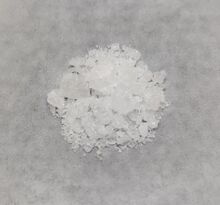Chemistry:4-Bromothiophenol
From HandWiki

| |

| |
| Names | |
|---|---|
| Other names
p-bromothiophenol
1-bromo-4-mercaptobenzene | |
| Identifiers | |
3D model (JSmol)
|
|
| ChEMBL | |
| ChemSpider | |
| EC Number |
|
PubChem CID
|
|
| UNII | |
CompTox Dashboard (EPA)
|
|
| |
| |
| Properties | |
| C6H5BrS | |
| Molar mass | 189.07 g·mol−1 |
| Appearance | Colorless crystals |
| Melting point | 72-74 °C[1] |
| Boiling point | 230.5 °C[2] |
| Hazards | |
| GHS pictograms |   
|
| GHS Signal word | Danger |
| H301, H314, H315, H319, H335 | |
| P260, P261, P264, P270, P271, P280, P301+310, P301+330+331, P302+352, P303+361+353, P304+340, P305+351+338, P310, P312, P321, P330, P332+313, P337+313, P362, P363, P403+233, P405, P501 | |
Except where otherwise noted, data are given for materials in their standard state (at 25 °C [77 °F], 100 kPa). | |
| Infobox references | |
4-Bromothiophenol is an organic compound with the formula BrC6H4SH. It forms colorless crystals.
Synthesis
4-Bromothiophenol can be synthesized via the reduction of 4-bromo-benzenesulfonyl chloride by red phosphorus and iodine in an acidic solution.[3] Hydrogenation of 4,4'-dibromodiphenyl disulfide also produces 4-bromothiophenol.[4]
Reactions
It reacts with acetylacetone in the presence of cesium carbonate to give 3-(4-bromophenylthio)pentane-2,4-dione. 4,4'-Dibromophenyl disulfide is also produced as the intermediate.[5]
Like other thiols, it reacts with silver nitrate to produce silver 4-bromothiophenolate.[6]
References
- ↑ Field, Lamar (2002). "Aromatic Sulfonic Acid Anhydrides". Journal of the American Chemical Society 74 (2): 394–398. doi:10.1021/ja01122a032. ISSN 0002-7863.
- ↑ "PhysProp" data were obtained from Syracuse Research Corporation of Syracuse, New York (US)
- ↑ Zhou, Shaodong; Liao, Zutai; Yuan, Jixin; Qian, Chao; Chen, Xinzhi (2012). "One-pot synthesis of 6-bromo-4,4-dimethylthiochroman". Research on Chemical Intermediates 39 (9): 4121–4125. doi:10.1007/s11164-012-0928-8. ISSN 0922-6168.
- ↑ Chen, Xinzhi; Zhou, Shaodong; Qian, Chao (2012). "Catalytic transfer hydrogenation of aryl sulfo compounds". Journal of Sulfur Chemistry 33 (2): 179–185. doi:10.1080/17415993.2012.654392. ISSN 1741-5993.
- ↑ Chen, Qian; Wang, Xiaofeng; Wen, Chunxiao; Huang, Yulin; Yan, Xinxing; Zeng, Jiekun (2017). "Cs2CO3-promoted cross-dehydrogenative coupling of thiophenols with active methylene compounds". RSC Advances 7 (63): 39758–39761. doi:10.1039/C7RA06904A. ISSN 2046-2069.
- ↑ Jardim, Guilherme A. M.; Oliveira, Willian X. C.; de Freitas, Rossimiriam P.; Menna-Barreto, Rubem F. S.; Silva, Thaissa L.; Goulart, Marilia O. F.; da Silva Júnior, Eufrânio N. (2018). "Direct sequential C–H iodination/organoyl-thiolation for the benzenoid A-ring modification of quinonoid deactivated systems: a new protocol for potent trypanocidal quinones". Organic & Biomolecular Chemistry 16 (10): 1686–1691. doi:10.1039/C8OB00196K. ISSN 1477-0520. PMID 29450434.
 |

